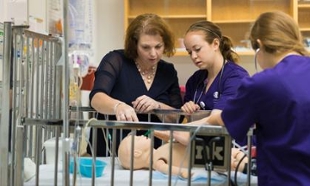Professor receives prestigious nursing education award
News
Even before she became a professor, Dr. Cindy Rubenstein was busy teaching. “From day one as a new nurse, you’re always teaching. Even if you’re not in an academic medical center with med students and interns, you’re teaching individual patients, you’re teaching families. It becomes the core of who you are.”
For 15 years, Rubenstein worked as a pediatric nurse practitioner in various primary care settings, and she continued to practice well after earning her doctorate. Now an assistant professor and director of undergraduate nursing at JMU, she brings clinical experience into the classroom.
“My philosophy of teaching is student-centered and focuses on real-life application,” Rubenstein says. “When you’ve been on the front lines, you know what the issues are. So I like to pull in case studies and adapt them as needed. Health care is always evolving. You have to stay current in order to prepare your students.”
The approach recently caught the attention of the American Association of Colleges of Nursing, which presented Rubenstein with its prestigious Excellence and Innovation in Teaching Award. It marks the first time that a JMU faculty member has won the award. In addition to receiving an engraved plaque at the AACN conference in New Orleans this month, Rubenstein has been invited to present a webinar for association members highlighting her innovative teaching and learning strategies.
In Rubenstein’s graduate course for pediatric nurse practitioners, students not only work through case studies, but also learn what it’s like to be an NP on call. “I pull from my hat all the phone calls that I got as a nurse practitioner and the students have to problem-solve,” she says. “They have to ask questions and get enough information over the phone to determine, is this child in crisis, do they need to go to the ER right away, or is this something that can be managed at home? As nurses, we’re so prepared to see patients, but we’re not always prepared to deal with issues over the phone.”
In the undergraduate Nursing Leader course — which Rubenstein developed in conjunction with JMU’s Center for Instructional Technology — students must advocate for changes in health care policy. “They research pending legislation and create a public blog in which they talk about the issue and how it influences nursing care,” she says. “Then they have to take a stance on the issue, contact legislators and key stakeholders, and execute an action plan. They leave the course and the program with the ability to advocate at a higher level for the profession and for patients.”
Rubenstein also teaches an undergraduate elective course on combatting childhood obesity.
“We’re not just educating these students to become nurses; we want them to be leaders in their profession,” she says.
Before coming to JMU in January 2008, Rubenstein taught in the Bon Secours Memorial College of Nursing in Richmond. When asked why she chose Madison, she replies: “I like the culture and the collaboration and all the teaching supports that exist, not only within the nursing department, but across campus.”
“Dr. Rubenstein has provided significant service to the Department of Nursing, the College of Health and Behavioral Studies, the university and the nursing profession,” says Dr. Julie Sanford, head of nursing at JMU. “She is a talented faculty member who is well respected by her colleagues, our students and the community. Her innovations in classroom and clinical settings help students obtain expertise with clinical reasoning, an essential skill for new and advanced practice nurses.”
###
By Jim Heffernan ('96), JMU Public Affairs

